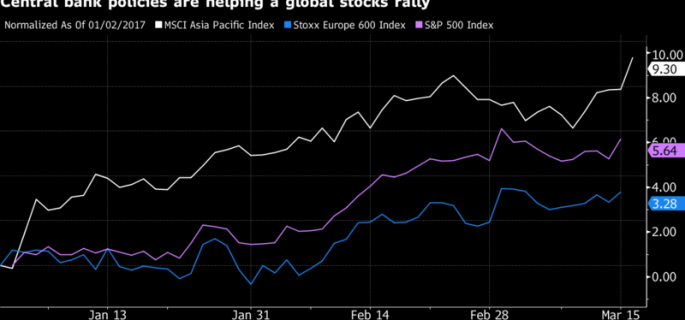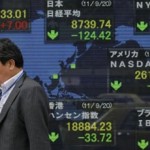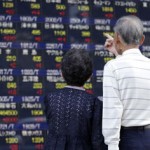Global Stock, Bond Rally Spurred by Central Banks: Markets Wrap

-
Gold and oil advance while dollar maintains losses on Fed move
-
Yen steady as BOJ stays the course; euro jumps on Dutch vote
Central banks ruled over financial markets, as the Federal Reserve’s move to raise interest rates without accelerating the timeline for future tightening sent global stocks and bonds jumping. The dollar steadied after Wednesday’s losses.
Rallies from Seoul to Jakarta pushed the MSCI Asia Pacific Index to the highest since mid-2015, after the S&P 500 Index jumped by the most in two weeks. Hong Kong shares briefly trimmed gains as China followed the Fed in raising rates. The yen edged higher after the Bank of Japan kept its unprecedented monetary easing program unchanged. The yield on 10-year Treasuries traded below 2.5 percent, while gold and oil extended gains.
“The world’s improving,” said Chris Weston, chief markets strategist at IG Ltd. in a phone interview from Melbourne. “There’s some signs of animal spirits coming through markets.”
The Fed raised its benchmark lending rate a quarter point and continued to project two more increases this year. U.S. equities extended gains as Chair Janet Yellen said in a press conference that the “simple message is the economy is doing well.” Investors anticipated the tightening and Treasury yields had climbed with the dollar on speculation the central bank might signal a faster pace of tightening. Those trades unwound late Wednesday in the U.S. as the Fed indicated it hasn’t fallen behind with its efforts to keep inflation in check.
“The Fed did a good thing as they signaled they will raise rates without destroying global equity markets,” said Norihiro Fujito, a Tokyo-based senior investment strategist at Mitsubishi UFJ Morgan Stanley Securities Co. “The Fed’s outlook hasn’t changed much from where they were in December, but the markets had gone overboard with rate hike expectations.”

Just hours after the Fed’s decision, the BOJ left its plans unchanged, increasing the policy divergence between the two central banks. With the economy slowly improving and bond yields under control, the BOJ is in position to hold steady for now. Meanwhile, China’s central bank raised borrowing costs as a stable economy and factory reflation give it scope to follow the Fed. The People’s Bank of China increased the rates it charges in open-market operations and on its medium-term lending facility.
Investors also reacted to economic data and developments in European politics. The euro touched a one-month high Wednesday after Dutch Prime Minister Mark Rutte’s Liberals easily beat the anti-Islam Freedom Party of Geert Wilders. The Australian dollar and kiwi slipped amid disappointing reports on unemployment and gross domestic product.
What investors will be watching:
- The Bank of England, the Swiss National Bank, Bank Indonesia and the Turkish central bank are also expected to stand pat in policy decisions.
- U.S. President Donald Trump will deliver a fiscal 2018 budget request to Congress on Thursday. He is proposing historically deep cuts that would touch almost every federal agency and program and dramatically reorder government priorities to boost defense and security spending.
- U.S. Secretary of State Rex Tillerson travels to Japan, South Korea and China in his first visit to the region since taking office.
Here are the main market moves:
Stocks
- The MSCI Asia Pacific Index rallied 1.3 percent as of 2:48 p.m. in Tokyo, to the highest level since June 2015. Benchmark indexes in Indonesia, Taiwan and Singapore rose at least 0.6 percent.
- Japan’s Topix was little changed. The benchmark index was down 0.1 percent before the BOJ’s decision.
- Hong Kong’s Hang Seng gained 1.5 percent, after rising as much as 1.6 percent before the PBOC’s move, while the Hang Seng China Enterprises Index jumped 1.7 percent, after surging 2 percent.
- Futures on the S&P 500 were up 0.2 percent after the benchmark gauge rose 0.8 percent to 2,385.26 on Wednesday, the highest level since reaching a record on March 1. The Stoxx Europe 600 Index added 0.4 percent.
Currencies
- The Bloomberg Dollar Index was little changed, after losing 1.3 percent on Wednesday, its biggest drop since Jan. 17.
- The yen was up 0.1 percent at 113.24 per dollar after advancing 1.2 percent in the previous session.
- The euro weakened 0.1 percent to $1.0729 after climbing 1.2 percent on Wednesday.
- The Australian dollar slipped 0.3 percent after jumping 2 percent Wednesday. Australian unemployment unexpectedly climbed in February as the economy shed jobs, indicating spare capacity remains a problem in the labor market and wages and inflation are likely to remain subdued.
- The New Zealand dollar declined 0.7 percent after data showed the economy grew at the slowest pace since mid-2015 as farm production and food manufacturing contracted.
Bonds
- The yield on 10-year Treasury notes held at 2.49 percent after tumbling 11 basis points on Wednesday. Similar Australian yields fell 10 basis points to 2.81 percent, and those in New Zealand also slipped 10 basis points to 3.28 percent. Japanese 10-year yields dropped two basis points.
Commodities
- WTI crude oil extended its gain, rising 0.6 percent to $49.14 a barrel after surging 2.4 percent Wednesday, its first advance in eight days.
- Gold added 0.5 percent to $1,226.41 an ounce, after rising 1.7 percent Wednesday.
Source: Bloomberg




























